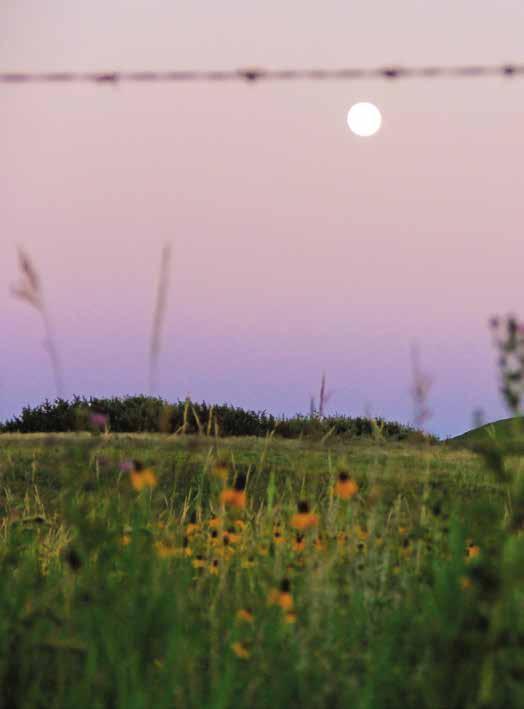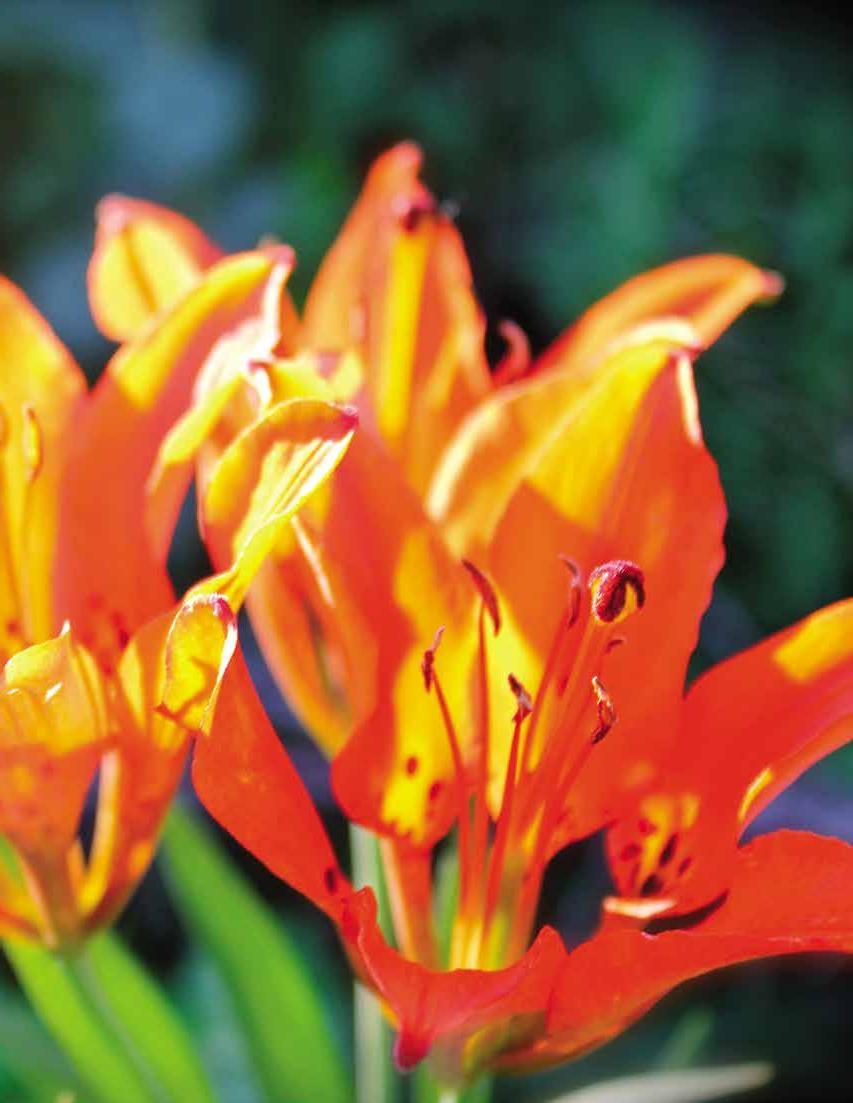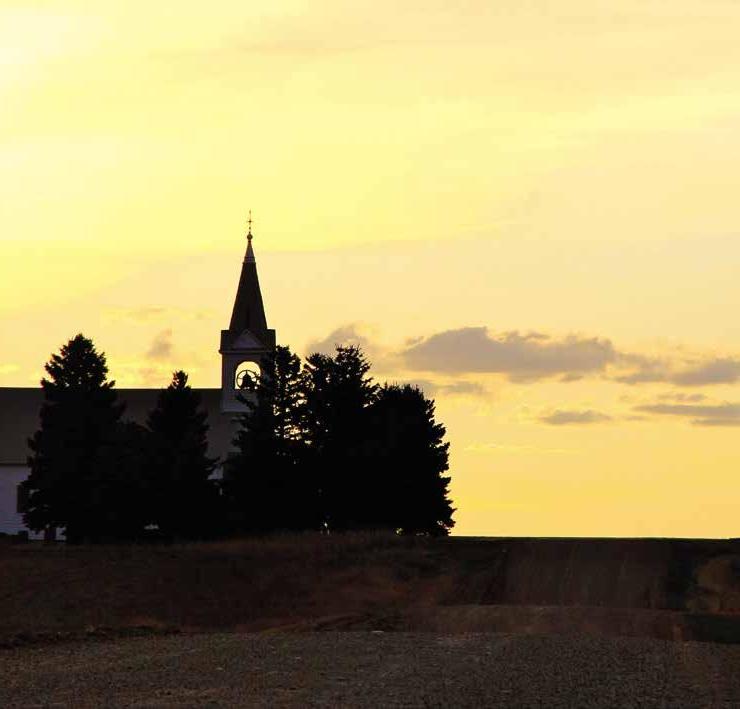
14 minute read
The Future Is A Distant Land
Photo by Jesse Veeder Scofield.
By Mark Holman
Advertisement
To the Old Ones, it had been known as North Dakota.The place had once buzzed with the sound of machines and the cacophony of a brief flowering of mechanized civilization. Now, the once powerful machines of another time sat, slowly decaying and melting into the landscape. They had been fueled, it was said, by the very substance of theEarth. The origin stories spoke of a time when the Old Ones in their arrogance consumed the Creation. It was said they had cracked the very depths of the Earth itself, churning its substance through machines, pumping and squeezing the finite vital fluids and ores to fuel their appetites that were never satiated. Energy from the Earth fueled life itself, as it always had, yet for a brief moment, like the builders of the biblical Tower of Babel, a civilization had flourished in an incredible efflorescence of mechanized man, by harvesting the power inherent in consuming the very body of the Earth.Energy sustained life. Without energy there would be no life.
Old maps the man had found among ruins displayed North Dakota as a large rectangle imposed on the landscape. He had always wanted to travel to these “places of the lines” to see what sort of imprints or barricades might be inscribed on the earth. He had once been in the ruins of an old library and had found a large, cracked and faded map of a place that had once been called the United States. Fascinated, he had rolled it up and taken it home. In the winter, he would often spread the fragile paper out on the table and stare in wonder at all the lines and places upon it. They had little meaning now.
The sun was beginning to dip in the west as he walked up to the top of the small ridge. A rusted, vertical cylinder with a conical top stood on the horizon just ahead, the remains of its corrugated, zinc metal shell overgrown with rust and the sooty stains of countless prairie fires. As he walked closer, he could see the remnants of foundations denoting the presence of what the Old Ones had called a farmstead. According to tradition, these places had been occupied by a family who raised vast quantities of food to feed people beyond number. In the unpredictable climate of the present, there were few places where food could be grown with any assurance. All but a few of these ancient agricultural villas were long abandoned, either melting back into the earth, or salvaged and recycled for new purpose by new people. Once common, most of the corrugated metal tubes, once used to store dried grains, had been stripped from the landscape by violent storms.
Still, here and there, a few had been spared by the terrible winds and remained, defiant sentinels of the lost age.
The structure had one small door through which he stepped onto a cracked and crumbled concrete floor. Light streaming through a round opening in the roof illuminated the dull zinc walls of a circular room about fifteen feet in circumference, the remnants of past fires lay in the center of the room recessed within a deep pit. Generations of fires, repeatedly heating and cooling the cement, had excavated a jagged hole, now filled with the detritus of a thousand warm nights. The walls were covered with a pictographic graffiti dominated by men on horses chasing animals with spears and guns. Imbued with meaning that was lost to him, he recognized this as the work of nomads he knew, an extended family group that migrated through this region. He smiled at the thought of meeting them again to trade.
As he walked, he had picked up small pieces of wood and dried dung to warm the night ahead. Setting a handful of cattail fluff in the center of the pit, he pulled another bundle from his pack. Undoing several layers, a small ember glowed with dull intensity. Setting the ember within the fluff, he blew, gently encouraging a small flame. In about a minute, small twigs crackled with the pleasing sound of life sustaining warmth. As he relaxed and went about the contented work of growing the fire into something that would last the night, he drank in the rising smell of burning wood like a soothing elixir. The fire crackled softly, the intensity and speed growing as it consumed the wood, smoke and sparks rising upward in a swirling dance of haze and points of light, moving out into the fading light through the hole in the conical ceiling.
About three feet from the edge of the fire pit, he unrolled a small lightweight pad he had found in a long buried basement of ruins that had once been a store. The Old Ones had made things of such durability, that even hundreds of years later, he could still find useful items. On top, he placed the bundle that held a lightweight sleeping bag, another wonder of the Old Ones. To many on the plains, the abandoned places of the Old Ones were places of ill fortune and unquiet spirits that were to be avoided. He often moved among the ruins with the trepidation of one entering a place where the voices of the dead spoke from every broken wall and shattered road with an unquiet restlessness.
There were unspoken rules of hospitality in places of shelter on the plains. A traveler would leave fuel for a future visitor or welcome others to join in a share of the food and warmth. Off to one side, illuminated by the growing firelight, the man spied two large pieces of well-seasoned wood. He lifted one of the pieces and tucked it into the fire. The flames licked up the sides of the old wood, slowly transforming the white, bleached shell black with the first incursions that would ultimately consume it. Grabbing the other, he tucked it opposite and a little off to the side so that it would not catch fire until the other piece was almost burned out. In this way, the fire would both burn long and create a sustained heat that would warm the cold concrete below him. He stared into the flames as they grew, a bed of warm coals pulsated with a red and black flicker, as the remnants of past fires came back to life. A sense of well-being came over him, comforted by the fire. Reaching into his pack, he pulled out two good-sized potatoes, placed them in a small pot and replaced the cover. Leaning over the fire pit, he chose a broken concrete ledge to let them cook overnight.
Digging further into his pack, he pulled out a few pieces of dried meat, bread and honey, placing them on a cloth. Reclining sideways on his bedding, he made a small sandwich, which he chewed and swallowed without ceremony.
A reddish yellow light streamed into the door as the last rays of sunlight danced on the floor and wall. The man got up and walked outside with a long package wrapped in buckskin. Unwrapping it, the long blade of a sword reflected the golden radiance streaming from the sun. Holding the sword high, he moved it side to side, watching the play of iridescent light on the surface. There was incredible energy in this reflected light. Many times he had used the energy to start fires or to heat water. If only it could be harnessed, he thought, his dependence on wood, dung and the black rock, mere derivatives of this primal source, could be set aside forever. This was an energy that took nothing from the landscape and held the promise of ending his constant struggle to find adequate fuel to survive. It was the energy that gave life to everything around him. What limitless reserves of existed in a source that rose to greet him every morning?
He looked at the shining blade with a sense of pride and accomplishment, knowing It would soon be in the hands of the most powerful person in the region. The man had made many swords, for many warlords, yet this was his finest work. He had searched the detritus of the Old Ones for the finest raw material. He had then crafted a blade that rivaled anything he had yet created, layers of steel revealed as gently flowing waves upon the surface of the blade, adding a textural beauty to what was already a work of art. Sitting down on a rock, he watched as the last rays of sunlight stretched out from the horizon, illuminating a canvas of purple shades infused with the last streaks of gold and yellow. The air was touched with the first anticipation of winter, a faint hint of crisp, cold freshness bit upon the edges of the smell of drying fall grasses, as the sun settled into the horizon.
Stepping back inside, the room had warmed significantly, firelight and heat reflected off the walls, creating an air of convivial coziness. The flickering created the illusion that the figures on the wall were in motion illuminating a live buffalo hunt moved across the wall. Lying down, he tucked himself inside the sleeping bag, pulling his hat down over his head to provide extra warmth. He smiled as he closed his eyes, listening contentedly to the crackle and pop of the fire.
In the morning, he awoke to the sun streaming in through the opening above. Wisps of smoke rose from the embers of the previous night’s fire. It still emitted a gentle warmth that felt pleasant as he crawled out of the sleeping bag and into the crisp bite of the fall morning.
He opened the steaming pot that had been cooking all night, vapor rising as the cover was removed. He poked the potatoes with his knife, causing the earthy aroma to waft up in a cloud of steam. Grabbing his pack, he pulled out a thick lump of hard cheese wrapped in cloth, placing it on a large piece of the remaining wood, he sliced a few thin pieces with his knife. Using the side of the knife blade, he pressed the thin slices into the potatoes, smashing them as he did so. Once cooled, he ate them without ceremony. To warm the chill of the morning, he used a stick to stir the hotter coals in the pit to the surface. They pulsated with an inner glow, sending pleasant waves of heat up from the pit.
Finishing, he stood up and moved to the edge of the door. The grass was edged with a sheen of silvery white frost that glowed in the growing light of the day. He looked across the jagged gorge of the valley and the ruins of the old town, staring at the broad expanses of rolling grass and plains. The Old Ones had preferred to build their cities in river valleys. Most of these places now were little more than ruins toppled within the gorges of violent water channels. He often reflected on what a happy life it must have been to be able to live safely along a river. Looking across the deep vertical sides of the river gorge, he could just see the top of his destination poking up on the horizon. He quickly rolled up his bedding, stuffed everything in his pack, and started to walk down the hillside.
To the Old Ones, this had been an important place of many industries that fueled their world. The imposing concrete structure had, it was said, been a storage facility for the vast quantities of food needed in the age of the Old Ones. The landscape was dotted with the remnants of these decaying, yet durable structures. It rose above the softly undulating hills of waving grass like a giant rectangle, its sheer vertical mass rising into the heavens. The dull, ivory colored concrete glinted in the sun from afar as if being lit from within. It was truly impressive to behold as the morning sun made it glow with an otherworldly radiance. Smoke rising from the area heralded it as a place of great activity. He caught the pleasant whiff of roasting meat mixed with wood smoke drifting on the wind. A smile came across his face as he drank in the smell and thought of trading for a fresh cooked meal. He quickened his step. He was almost always hungry these days.
As he looked at the rectangular behemoth, the man had difficulty believing that so much grain could be produced to fill the giant vertical cylindrical tubes that stood in long rows and formed the largest manmade thing he had ever seen. Its high walls had withstood the onslaughts of many attackers as the most impregnable fortress on the northern plains.
Part of the structure had once been used, it was said, to burn the black rock. Some said that the black rock held a mysterious power that the Old Ones refused to heed. The man, as an ironsmith, revered and respected the power inherent in this material, marveling at its ability to change the very structure of metal. Why had the Old Ones, with all their wizardry and knowledge not given it the same respect? These were just stories. Stories told by drunken old men around the fire at night. Surely, the same people who built this mighty citadel had not been not so shortsighted.
He remembered the old story often told at night around a warm fire when he was a boy. It was a familiar tale, a sort of creation story for the current age. As he walked, he retold it to himself.
For many ages, humanity had lived with the Earth and was one with the Web of All Things and the Creator. In the beginning there was the Creator and nothing else. The Creator created life in a complex web that connected and bound all things together. Humans were created as part of the Web and lived as part of its interconnected system. As humans grew in their knowledge, they developed technologies that gave them an illusion of being outside the Web of All Things. They took much and gave back little, fueled by the body of the Earth. Coming to believe in their mastery over all things, they misused the Earth in increasing frenzy, as the fibers of the Web stretched to breaking they consumed the very substance that held the Web together. The Old Ones had the illusion of being disconnected from the Web, even as it bound them more tightly within it. One day, the fibers could stretch no more. One-hundred thousand nightmares befell the Old Ones as the timeless guardians of the Web rose up. It had been a terrible time followed by a long period called The Forgetting when everything started over.
The man smiled and walked along the aqueduct that ran from the river of the ruined town to the sprawling trade center that straddled the old road. He always marveled at this road and its two raised embankments that pointed straight east and west to the horizons. Legend said that they extended to where the land met the great oceans. The nomads who travelled on this ribbon of rock had never seen the end of it. In places it had been broken up by rivers or blocked by rock falls that further obfuscated its original purpose. In most areas, it was covered with a scrum of plants that rose up from frost-worn cracks, impeding the movement of a walker. Here, near the citadel, it was groomed smooth and water flowed in the channel between the roads in an open aqueduct, making a pleasing sound that calmed the senses. The sunflowers protruding everywhere along the road, were finishing their annual bloom, like colorful many headed hydras bursting with yellow, then fading to brown. Winter would not be far off.
Extending to the horizon north and south from the road, a watery ditch, shallow on one side with a steep grade on the other, sloped up to a ridge topped by an assortment of machines of the old civilization. The detritus had served for centuries as an effective palisade against attackers of all kinds. The remnants of machine containers that had transported the Old Ones and their products were packed end to end and stacked upon one another to a great height, forming the most imposing defensive wall on the plains. He had heard that long ago, teams of men and animals had brought these machines, at the behest of the first ruler, clearing them from the surrounding landscape as far away as the forests to the east. In the ditch below the palisade, amid the cattails and fluorescent green algae-covered water, rusty, metallic hulks of spiky and protruding iron rose out of the water forming another barrier.
The bottom of the ditch was lined with an intimidating collection of implements that had once been used on the great farm estates. Upon this bulwark, made of the tools of a bygone era, was a narrow catwalk fronted by a protective wall upon which armed men walked. The fire and oxidation kissed metal, a mottled mix of shades of brown, made a statement on the landscape of something permanent and manmade. Staring at the seemingly endless wall, its enormous proportions reaching to the horizons and the heavens, he thought wistfully of stories he had heard of the incredible efforts required to construct great pyramids in a distant time and land. It was once again a time when such things were possible.
Mark Holman is Library Director at Sitting Bull College.










